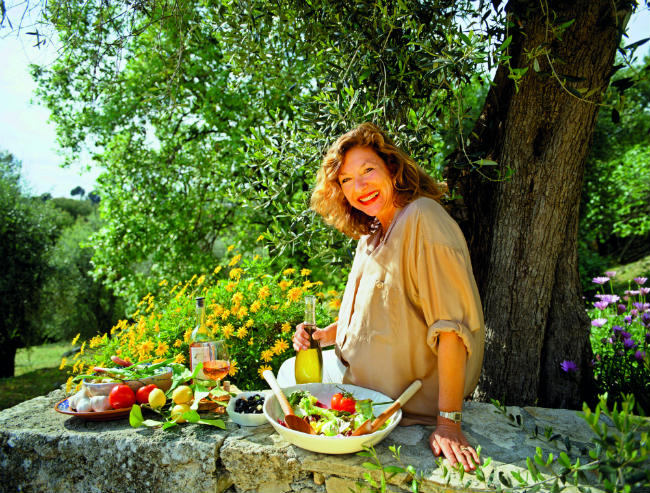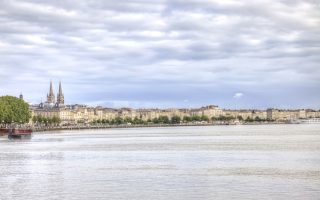Interview with Author Carol Drinkwater about her New Novel, The Lost Girl
Like a tidal wave, the senselessness of the Paris attacks poured out of her. Carol Drinkwater described the images of strewn bodies gleaned on news reels that night. She committed to paper the caterwaul of the ambulances shattering the stillness and the anonymous masses pressed behind the cordons…waiting.
Six feverish months later, her latest novel The Lost Girl was complete.
“I was in tears,” says the 69-year-old Anglo-Irish author, her voice catching ever so slightly at the memories. “My mother and I were watching the news and I was translating to her what was happening as the evening went on. We were watching the people standing outside the Bataclan and she said to me, ‘Think of all their mothers’. It was like a key that unlocked something inside me. I thought a fraction of their life story, everyone waiting there, is locked in there and the result is yet unknown. I started writing within a fortnight of the attack.”
The November strike was the tipping point, after weeks of bottled-up rage in the wake of the Charlie Hebdo attacks; just a stone’s throw from her husband Michel’s Paris office. Watching powerless her adopted nation under siege once more – the echoes of barely a few months ago still achingly fresh in her mind – sent her reeling.
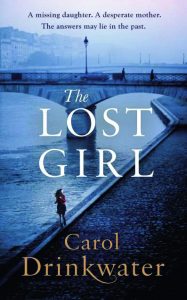
The Lost Girl by Carol Drinkwater
CHARLIE HEBDO
“My husband, Michel, had been particularly touched by the Charlie Hebdo attack,” she says in one urgent breath. “He was in Paris that day and when I heard about the attack, I immediately, selfishly, asked, ‘Where?’ I went on the internet and saw that it was literally steps from where Michel was. I tried to call him and then sent him a message and was completely fraught until I heard he was okay. I don’t think he’d even heard about the attack at that stage because he was in a meeting.
“When he made his way home, we discovered it was the Charlie Hebdo team, and one of the illustrators was a designer who had worked with Michel. The French take freedom of speech and the right to express what they believe in very seriously, and to see how at risk that was… This freedom is one of the cornerstones of French philosophy and I take it very personally. It all started to take its place in my mind.
“When the Bataclan attacks happened it was just horrifying. I just couldn’t get my mother’s remark out of my mind. I was so traumatised by it that I decided I had to write a book,” explains Drinkwater, who was dealt yet another blow when her mother passed away shortly afterwards.
The aftermath is hauntingly – and graphically – rendered in the novel, which follows the parallel stories of two women whose paths cross on the night of the 2015 terror attack. One of the heroines, Kurtiz Ross, has received word that her missing daughter may be in Paris to attend a concert. When terrorists storm the Bataclan and open fire on the crowds, she is caught up in the chaos, grappling with the prospect that her child could be one of the victims.
“I have very little memory of actually writing The Lost Girl,” she muses. “I spent a month at the French national library watching François Hollande’s speech and the reels over and over, until I knew how many ambulances were there. I wanted to get every detail right, out of respect. And then the book sort of wrote itself. It just came out; maybe because I felt so passionate about it, and still do.”
Listening to the quietly determined woman, it is hard to line up the socially-conscious author seething at injustice with the award-winning actress who once fronted the cast of All Creatures Great and Small as vet’s wife Helen Herriot.
And yet, she insists, writing is and always seemed to be a natural extension of her acting career. Storytelling had always permeated her work, an invisible but irrepressible force lurking behind every role, even as an aspiring thesp. In fact, it was her stint at drama school that inadvertently fed her hunger for words.
“They gave us this exercise, which was to write the backstory of our characters, so that we began to understand that they didn’t just exist in limbo,” she recalls. “People came in with half a dozen lines and I arrived with 25 or 30 pages…
“I think writing and acting are the same thing: one I’m in charge of, and one I’m part of the process of.”
It was her husband who encouraged her to pursue her literary aspirations, she points out fondly; before adding, by the by, that the impulsive (and very confident) filmmaker dared to propose on their very first date.
In 1986 her first children’s novel The Haunted School was adapted for television – with Drinkwater in the lead. But it’s her bestselling Olive trilogy, in which she candidly chronicles the trials of rescuing a ruined olive farm overlooking the Bay of Cannes – and breaking bread with rather sceptical locals – which truly cemented her status as a deft raconteur.
Her fascination with the olive tree later led her on a solo 17-month Mediterranean expedition in search of its mythical secrets in 2005.
Far from being a leisure trip, she was swept head first into conflict and faced with unspeakable human rights violations. She is matter-of-fact as she recounts how, jolted into action by sheer indignation at the tales of Israeli settlers bulldozing Palestinian olive groves under the cover of night, she joined a protest to replant trees on land cleared by the army.
But the accidental peace fighter’s acts of dissent landed her in hot water many a time. She noticeably tenses up at the memory of being held at gunpoint by an Israeli soldier.
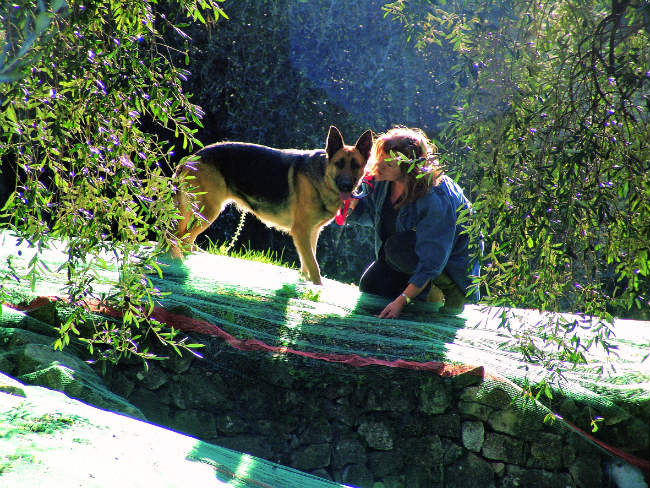
Harvesting olives
TRICKY SITUATIONS
“You see it on television all the time, this violence, but when you actually have a large rifle pointed at your head it’s terrifying,” she chuckles nervously.
“I have no idea how it happened. They’re very young these kids, 18, 19 years old. I had been visiting Palestinian families… I dropped my bag, everything, to try and get my passport.
“It was a shambles. In the end he let me go. In Algeria, I was caught up in Al Qaeda bombings. I’ve been in some tricky situations in Libya. I blame the system really. It’s pummelled into these people to hate.”
Witnessing such depths of human suffering is perhaps what prompted her to stray further from the (relatively) light-hearted roots of the Olive memoirs in recent years. Despite the undeniably darker tone of her latest works, she insists that her travels, far from jading her, filled her with renewed optimism.
“More than anything it’s the good values of humanity that I discovered, rather than the negatives,” says Drinkwater, who recounts the often fraught journey in The Olive Route; a book which has since been turned into a documentary.
“I went into many Palestinian homes, refugee camps, and I saw the generosity of people who were victims of war zones, people who had nothing, and that touched me greatly. I like to think that even in my darkest moments there’s a light.
“Apart from anything else, the olive tree is a wonderful teacher. Olive trees fight back; they will re-shoot under virtually all circumstances. I believe in the power of healing and nature, the fact that things will regrow after a loss; that’s a recurring theme through my work and in The Lost Girl.”
Even by her standards, The Lost Girl pushes into emotive, and controversial, territory. As the release date looms, Drinkwater confides she is wracked with anxiety – beyond the usual tinge of pre-publication trepidation. Was tackling the Paris attacks insensitive? Is the memory still too raw? The possibility of being accused of sensationalism or misappropriating tragedy is never far from her mind.
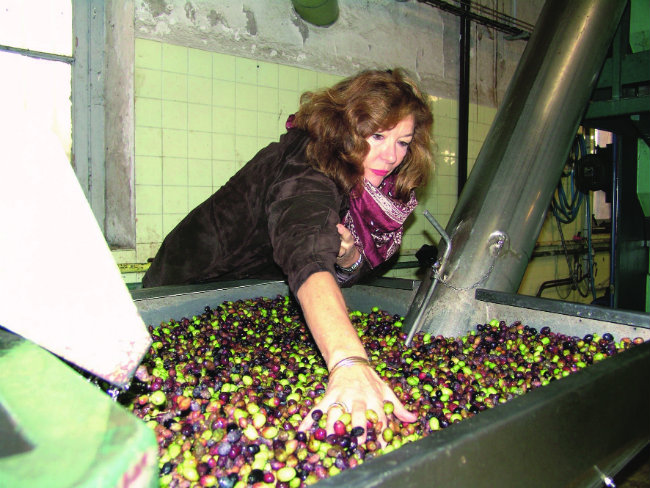
Carol Drinkwater washes olives
PERSONALISING THE STORY
“I’ve thought about it since I decided to write the book,” she says thoughtfully, before reeling off her defence. “I knew that as a foreigner I was risking people saying to me, ‘How dare you take our modern history and use it for something that’s commercial drama?’ But I live here and I count it as my own history in a way. In my heart, I’m certainly much more French than I ever was English and I don’t feel a betrayal in that sense. I wanted to personalise this story rather than it being sensational news. It was important for me to give these people lives.
“Every one of the people who died or was injured that weekend has a family and a story, and I wanted to bring it right back to the essential; to what we are, to each one of us as a human being rather than block media news,” she pre-empts with disarming conviction. “I write from my gut and it was a story I had to write.”
From France Today magazine
Buy Carol Drinkwater’s The Lost Girl on Amazon below:
Share to: Facebook Twitter LinkedIn Email
Leave a reply
Your email address will not be published. Required fields are marked *

